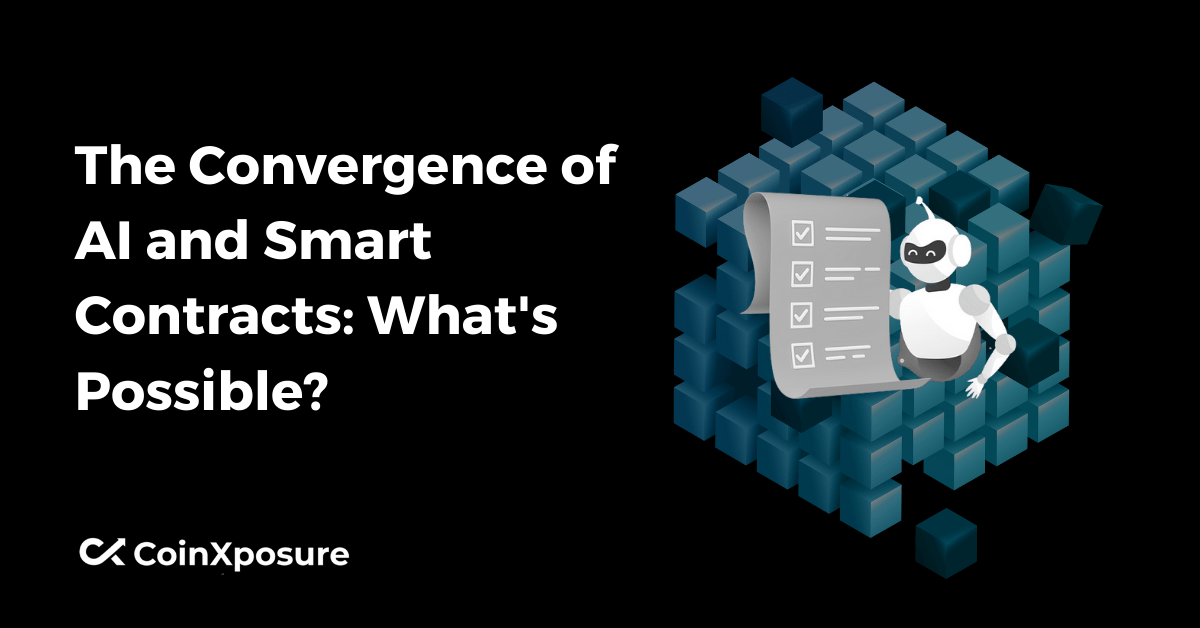The convergence of artificial intelligence (AI) and smart contracts heralds a new era of possibilities in technology and finance.
AI, with its ability to analyze vast amounts of data and make intelligent decisions, combined with smart contracts, which automate and execute agreements without intermediaries, presents an intriguing landscape of innovation and potential.
This fusion promises to revolutionize various industries, from finance and law to healthcare and supply chain management.
In this exploration, we delve into the synergies, opportunities, and challenges posed by the convergence of AI and smart contracts and contemplate the transformative possibilities that lie ahead.
Understanding Smart Contracts
Smart contracts are self-executing contracts with the terms of the agreement directly written into code. They run on blockchain technology, ensuring transparency, security, and immutability.
Smart contracts automate the execution of tasks and agreements, removing the need for intermediaries and reducing the risk of errors or manipulation.
They are versatile, applicable across various sectors such as finance, real estate, supply chain management, and more.
Smart contracts offer numerous benefits, including increased efficiency, lower costs, enhanced security, and greater trust among parties involved.
However, challenges such as legal and regulatory considerations and potential code vulnerabilities must be carefully addressed for widespread adoption and effective implementation.
Exploring Artificial Intelligence
Artificial intelligence (AI) is a branch of computer science focused on creating systems capable of performing tasks that typically require human intelligence.
AI encompasses a wide range of techniques, including machine learning, natural language processing, computer vision, and robotics.
Its applications span across industries, including healthcare, finance, transportation, and more. AI systems can analyze large datasets, extract insights, and make predictions or decisions autonomously.
Key advancements in AI, such as deep learning and neural networks, have significantly improved its capabilities in recent years.
While AI offers immense potential for improving efficiency, productivity, and decision-making, ethical considerations, bias mitigation, and the responsible use of AI remain critical areas of concern and exploration.
The Intersection of AI and Smart Contracts
The intersection of artificial intelligence (AI) and smart contracts presents a fertile ground for innovation and disruption across various domains.
AI can enhance the functionality and efficiency of smart contracts by providing intelligent automation, predictive analytics, and decision-making capabilities.
Conversely, smart contracts can leverage AI algorithms to access and analyze external data, enabling dynamic and adaptive contract execution.
This synergy opens up new possibilities for applications such as decentralized autonomous organizations (DAOs), predictive maintenance contracts, dynamic pricing agreements, and more.
However, challenges such as data privacy, security, and interoperability between AI and blockchain technologies need to be addressed to realize the full potential of this convergence.
Despite these challenges, the integration of AI and smart contracts holds the promise of transforming how agreements are made, executed, and enforced in the digital age.
Possibilities and Opportunities in AI and Smart Contracts
Here are some possibilities and opportunities in the intersection of AI and smart contracts:
- Enhanced Automation
- Improved Decision-Making
- Expansion of Decentralized Finance (DeFi)
- Increased Efficiency
Enhanced Automation
The convergence of AI and smart contracts enables seamless automation of complex processes, reducing human intervention and streamlining operations.
Improved Decision-Making
AI-powered analytics can enhance the intelligence of smart contracts, enabling data-driven decision-making and risk management in real-time.
Expansion of Decentralized Finance (DeFi)
AI-driven smart contracts have the potential to revolutionize DeFi by offering advanced financial products and services, such as automated lending, prediction markets, and decentralized asset management.
Increased Efficiency
Smart contracts combined with AI algorithms can optimize resource allocation, reduce transaction costs, and improve overall efficiency across various industries.
The convergence of AI and smart contracts presents many possibilities and opportunities for businesses, organizations, and individuals to innovate, collaborate, and thrive in the digital economy.
Future Outlook of AI and Smart Contracts
Here are some future outlooks in the intersection of AI and smart contracts:
- Continued Innovation
- Integration with Emerging Technologies
- Regulatory Evolution
- Mainstream Adoption
Continued Innovation
The convergence of AI and smart contracts is expected to drive ongoing innovation in technology and business models, leading to the development of new applications and solutions across industries.
Integration with Emerging Technologies
AI-powered smart contracts will likely integrate with other emerging technologies, such as the Internet of Things (IoT), 5G networks, and decentralized identity solutions, further expanding their capabilities and use cases.
Regulatory Evolution
As AI and smart contracts become more prevalent, regulatory frameworks governing their use are expected to evolve to address legal, ethical, and security considerations, fostering trust and adoption.
Mainstream Adoption
With advancements in usability, interoperability, and scalability, AI-driven smart contracts are poised to gain mainstream adoption, becoming integral components of digital infrastructure and business processes.
The future outlook for the convergence of AI and smart contracts is one of continued growth, innovation, and transformation, with profound implications for how business is conducted, value is created, and society functions in the digital age.
Conclusion
The convergence of artificial intelligence (AI) and smart contracts holds tremendous promise for revolutionizing how agreements are made, executed, and enforced in the digital age.
By combining the intelligence of AI with the automation and security of smart contracts, businesses, organizations, and individuals can unlock new opportunities for efficiency, innovation, and trust in various domains.
From enhanced automation and improved decision-making to the expansion of decentralized finance (DeFi) and the creation of novel business models, the possibilities and opportunities presented by this convergence are vast and far-reaching.
However, realizing this potential will require addressing challenges such as regulatory concerns, interoperability issues, and ethical considerations while also fostering collaboration and standardization among industry stakeholders.
As AI-powered smart contracts continue to evolve and gain mainstream adoption, they can reshape industries, disrupt traditional business models, and create new pathways for economic growth and societal development.
By embracing this convergence with foresight, responsibility, and a commitment to ethical innovation, we can harness its transformative power to build a more efficient, equitable, and resilient future for all.












